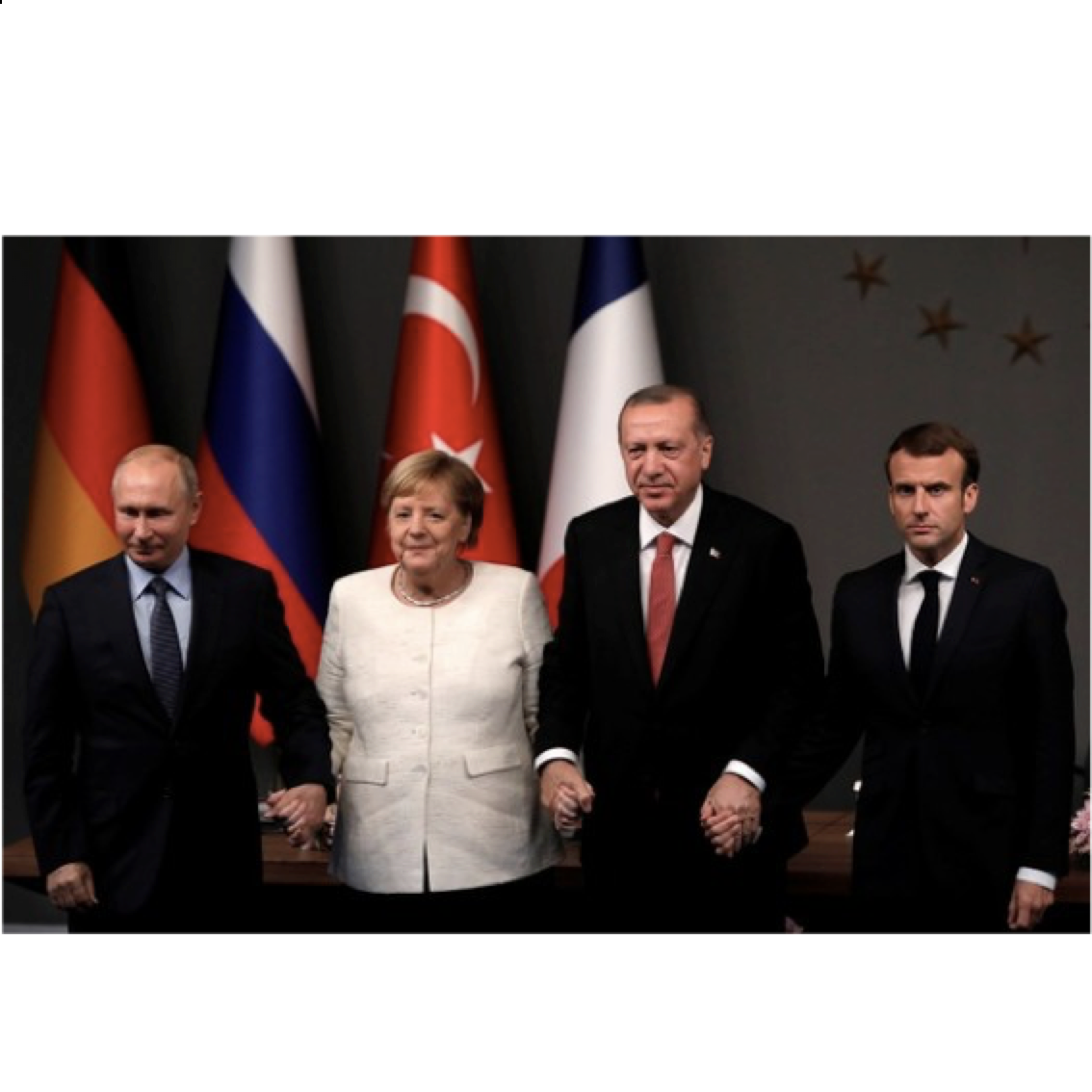The Hushed-Up Summit Success
Seven year-old Syria conflict gets a shiny new peace building format – while western propaganda media look the other way.
That’s certainly unprecedented but interesting and symptomatic: The biggest German daily „Süddeutsche“ squeezes a few lines on its front page governed by regional elections in the state of Hesse and the umpteenth article on the truly terrible and deplorable synagogue killing spree in Pittsburgh, USA. Leading opinion shapers such as „Spiegel online“ and New York Times enumerate a few dry facts – and that’s it: Russian president Putin, his Turkish colleague Erdoğan, German chancellor Merkel and French president Macron met on a sunny Saturday afternoon in Istanbul overlooking the Bosporus. Nobody had expected a breakthrough – but progress was nevertheless both substantial and meaningful, though the US and Iran were not taking part.
Most important: Regime change including Assad removal is obviously off the table. There were three „small-size“ diplomatic highlights:
- The summit ended with a joint declaration – not a foregone conclusion.
- The participants emphasized support for the results of the recent Russian-Turkish Sochi summit.
- Germany and France have not contradicted or excluded participation in the Astana peace process driven by Russia, Turkey and Iran, host Erdoğan expressedly invited them and others in his concluding statement.
That is important, because the absence of Syria’s old friend Iran was obviously a compromise based on the fact, that Teheran’s participation would have run the risk of upsetting Washington, which, just a week before the announced much tougher sanctions against Tehran starting November 5 this year, might lead to both unforeseeable and uncontrollable consequences by the Trump administration.
The summit results include:
- A new constitutional committee of 150 participants will be set up to start working by the end of the year. Syria, the Syrian opposition and the U.N. are to name 50 participants each.
- The ceasefire for the last IS/Daesh stronghold in Syria’s Idlib province has to be upheld – while the fight against terror militias continues.
- Conditions are being set for the voluntary and safe return of refugees to Syria.
Chancellor Merkel stressed the need for free elections, with the right of participation for refugees from Syria. President Putin announced Russian participation the work of the constitutional committee. He also stated, that Turkey was fulfilling its obligations from the last Sochi agreement. President Erdoğan was reported to have shared details of the Khashoggi murder case with the summit partners.
Syria has already signaled its consent to U.N. efforts in formulating a new constitution, a task, which outgoing special envoy de Mistura has publicly declared as his last in his tenure. But Damascus made it clear, that the three-way set-up of committee participants was not to its appreciation.
In fact, this procedure marks yet another questionable U.N. interference in the internal affairs of one of its member states, showing handwriting marks of Washington’s making. The idea of holding elections with millions of voters camping and floating abroad, many under questionable dependence from powers hostile to the government or even participating in efforts to disrupt it, is yet another questionable proposal. In Germany, many thousands of Syrian refugees are possibly not correctly registered, co-operation with the Syrian government is at least disturbed and nearly dysfunctional, western election fraud as interference in inner Syrian affairs comes up as an issue.
In the background of this new summit format loom recent and sensational declarations by participant Macron. The French president had launched a kind of „strategy offensive“ during the last week of August, declaring a new European security strategy and listing not only Russia as partners, but Turkey and Iran as well. Among observers questions come up, as in how far this Istanbul summit could serve as a testing ground for this new strategy, which had a interesting feat in common with Macron’s move: Western big media were definitely not interested. Usually in western political and public life, proposals of this political weight with chances of implementation are widely and intensively discussed, TV talk shows with experts, reports on progress etc. make headlines. Not so this time. Analysts ask themselves, in how far watershed strategy changes can be taken for real, if they don’t come to life in the media. In cases like this Istanbul summit, where Macron could have made a strong impression following his own ideas, German language has it, that „after heavy birth throngs, the mountain begot a mouse“. Just days ahead of the summit, CIA-backed liveuamap.com registered fresh fortifications for the small elite unit of French troops in northerns Syria and in the Afrin area, Turkey’s state-owned phone company Turk Telekom is erecting its first towers on Syrian soil.
Iran was missing, as an ostensibly peaceful nation since hundreds of years and longstanding ally of Syria, deserving no less than a distinguished role in any peace-building effort. The summit failed to address numerous aggressive Israeli air strikes and presence of thousands of US troops in northern and eastern Syria, headquartered in At-Tanf, as well as aggressive Washington procedures in erecting a PKK-leaning Kurdish administered would-be satellite state under its protection. As if encouraged by the Istanbul gains, Turkey bombed targets in that area in the wake of the summit.
Fo all its shortcomings, the Istanbul meeting has opened doors, helped pave the way for further constructive progress and raises hope for war-torn Syria. Europeans including active French leader Macron have yet to prove their abilities to set their distinct agenda. But fact is, that the present Astana group of leader Russia, Turkey and Iran are the real movers.
Russian original: http://inforos.ru/en/?module=news&action=view&id=78655


